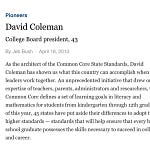In early January, 2023, David and I had a long talk about several issues in reading education. I’m working on segmenting the audio recording into focused parts and will post them regularly until the audio is exhausted. The topic for this first of several podcasts is David’s take on the complementary role of the phonological loop in reading as a complex of regulated cognitive processes and as a target of reading pedagogy as enacted in regular classrooms, specifically regarding word identification and phonics.
Roughly 18 minutes in length, the tape divides into five parts. The first part just under a minute, spells out my question for the segment, i.e., “Should teachers approach phonics instruction as though the words under study are nonsense works, i.e., isolated from meaning cues or syntactic cues, to help learners achieve the goal of word identification?”
The second part, lasting roughly three minutes, gives us David elaborating on his own complex view of reading, in which he develops the notion that Phonics advocates and his complex view share the same ultimate goal of teaching readers to achieve automaticity in word recognition.
The third part, which I’m remembering through a visual mnemonic of Sherlock Holmes running in Nike shoes (you’ll see what I mean), presents David’s stunning rebuttal to the argument that learners ought not be taught to use the three cuing systems (actually, David names the fourth system, pragmatics, too). David discusses three cognitive “analyzers,” an orthographic one, a phonological one, and a contextual analyzer, each of which is crucial to the child in the act of sleuthing for a word, a far cry from guesswork, none of which has the corner on the market of single best way for all circumstances.
Part Four extends David’s earlier discussion of “clicks and clunks” in the cognitive experiences of all readers at one time or another during the act. Part Five, the last six minutes of the tape, provides a really important clarification.
David talks about his talks with Ken Goodman during the genesis of what became reduced to Whole Language. Though David is fully aware of the unfortunate denigration of the metaphor “reading is a guessing game,” he refocuses our gaze on the modifier “psycholinguistic,” which makes all the difference. David proposes a renewed focus on the Science of Reading Pedagogy, SoRP, where the next galaxy opens up fresh fields for discovery.
Enjoy this podcast as you listen to this man who literally edited the Handbook on Reading Research for years and share it with others. It might help stakeholders in public education put this iteration of the reading wars in perspective.
In humanity’s long walk toward civilization, our collective tendency to latch onto a simple solution without fully understanding the problem has been our Achilles heel. I hear the passion and belief in the voices of phonics first advocates and admire their gumption. But gumption isn’t going to change the fact that the single greatest predictor of failure to thrive as a reader is zip code.





Share this post